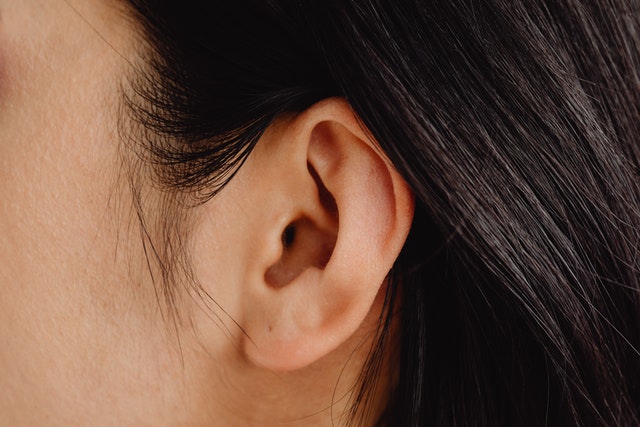Ear wax serves the purpose to keep the ears healthy by acting as a cleaning and protective agent against germs and small particles such as dirt and dust.1
Excessive ear wax can cause blockage of the ear canal resulting in itching, pain, ringing in the ear, cough, and in most extreme cases hearing loss.1
Elderly people and people using hearing aids and earplugs are at greater risk of developing ear wax blockage.1
What is the best way to remove ear wax?
There are several options. Currently, 4 main choices are recommended by clinical practice guidelines.
1. Sometimes less is more
Normally old ear wax is removed through a self-cleaning process via jaw motion and skin shedding.1
This self-cleaning process in conjunction with normal hygiene is usually sufficient to remove ear wax.1
It doesn’t require much time and can reduce the need for unnecessary treatments that can sometimes cause more harm than benefits.1
2. Irrigation can be an effective method for ear wax removal
Irrigation consists of using a warm water stream to clear the ear canal.
Irrigation can be performed at home and is among the best ways to remove ear wax and is a valid option in young children.2
A study testing 3 different syringes for irrigation (Elephant Ear Washer Bottle System®, OtoClear® Spray Wash Kit) found them as effective as metal curettes in terms of percentage of cerumen removed and user satisfaction.2
Irrigation is not recommended in people susceptible to ear infections, with eardrum lacerations, or ear tubes.1It can cause temporary dizziness and pain.1
3. Physical removal should be performed only by healthcare professionals
Ear nose throat specialists should be involved especially when patients are not able to express discomfort and symptoms.1 H
ealthcare professionals use special instruments and suctioning devices to perform physical ear wax removal.1
Physical removal is a fast process, and the results are fast as well.1
It should only be performed by a professional.
It can result in discomfort, ear infections, and bleeding and might not be effective in the long term.1
4. Ear drops can be effective against compacted ear wax
Ear drops containing cerumenolytic agents can soften and break the accumulated ear wax and favour the subsequent removal by other methods.1
These agents can be oil- or water-based.3
But no conclusive evidence exists so far on their effectiveness compared to other methods.3
There is no definitive high-quality evidence supporting this method in favour of no treatment.3
While a study showed that a single application of an ear wax softening agent in conjunction with irrigation was successful in clearing the ear canal,4 another study found that a solution of saline water was on the same plane of different cerumenolytic agents.5
Ear drops are not recommended in children younger than 3 years and in patients with eardrums lacerations.2
Current recommendations suggest applying ear drops once or twice daily for 3 to 5 days.1 This could be the best way of removing ear wax if you are looking for something fast, that can be done at home avoiding doctor visits.1
Currently, no particular side effects are reported, but similarly, to other described approaches, cerumenolytics’ effects might not be long-lasting.1
There are some practices not to follow
Over-cleaning can not only cause infection but also increase the chances of ear canal blockage.1 O
live oil drops or sprays, ear candling, and any method requiring putting objects in the ears are not advised.1
Cotton swabs might be more dangerous than beneficial
Despite being the most common method to clear the ear canal,6 the use of cotton swabs can result in ear injuries including rupture of the tympanic membrane and ear infections, as well as itchiness, ear pain, tinnitus, hearing difficulties and ear discharge.1
Due to these risks, this approach is currently not advised in guidelines.1
In general, putting anything inside the ear can push the wax further down the canal and cause the opposite effect than the desired one resulting in injuries.1
Ear candling can cause burning to the ear canal, ear blockage, lacerations and ear infections.1
Besides these associated damages they are not effective in removing ear wax.1
What is the best way to remove sticky ear wax?
Based on your personal needs it is important to talk to your doctor before determining the best way to remove ear wax for you.1
It is important to keep in mind that ear wax is naturally produced by the body and unless it causes symptoms there is no need to intervene.
References
1. Krouse, H. J., Magit, A. E., O’Connor, S., Schwarz, S. R., & Walsh, S. A. (2017). Plain Language Summary: Earwax (Cerumen Impaction). Otolaryngology–head and neck surgery : official journal of American Academy of Otolaryngology-Head and Neck Surgery, 156(1), 30–37. https://doi.org/10.1177/0194599816680327
2. Shope, T. R., Chen, C. P., Liu, H., & Shaikh, N. (2019). Randomized Trial of Irrigation and Curetting for Cerumen Removal in Young Children. Frontiers in pediatrics, 7, 216. https://doi.org/10.3389/fped.2019.00216
3. Aaron, K., Cooper, T. E., Warner, L., & Burton, M. J. (2018). Ear drops for the removal of ear wax. The Cochrane database of systematic reviews, 7(7), CD012171. https://doi.org/10.1002/14651858.CD012171.pub2
4. Singer, A. J., Sauris, E., & Viccellio, A. W. (2000). Ceruminolytic effects of docusate sodium: a randomized, controlled trial. Annals of emergency medicine, 36(3), 228–232. https://doi.org/10.1067/mem.2000.109166
5. Whatley, V. N., Dodds, C. L., & Paul, R. I. (2003). Randomized clinical trial of docusate, triethanolamine polypeptide, and irrigation in cerumen removal in children. Archives of pediatrics & adolescent medicine, 157(12), 1177–1180. https://doi.org/10.1001/archpedi.157.12.1177
6. Khan, N. B., Thaver, S., & Govender, S. M. (2017). Self-ear cleaning practices and the associated risk of ear injuries and ear-related symptoms in a group of university students. Journal of public health in Africa, 8(2), 555. https://doi.org/10.4081/jphia.2017.555
Photo by Karolina Grabowska from Pexels



